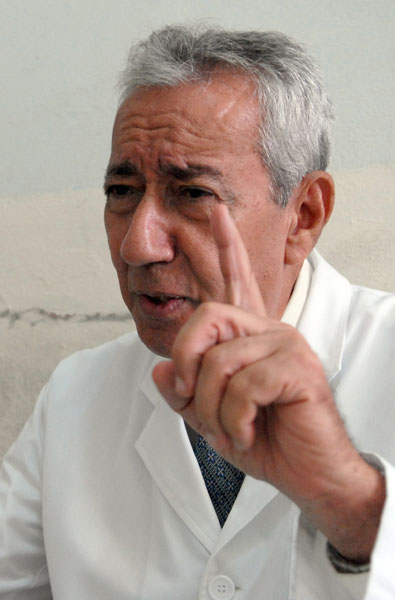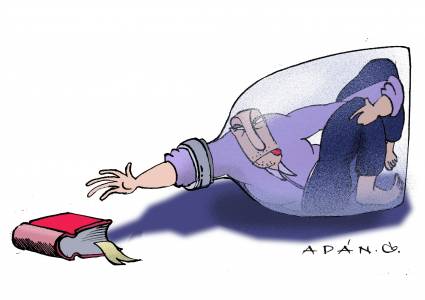“You are welcome once again, journalist.”
-Thank you very much doctor.
She shows me the way to walk to the seat “where she will be most comfortable because our conversations are always long.”
He closes the door, and sits down, at ease, hardly squeezing his shirt and jacket. “You always so elegant,” I tell him. “Customs from other times, some say,” he jokes.
Once again, psychiatrist Ricardo González Menéndez, with more than 40 years of experience in the study and treatment of addictions, adviser to the Drug Addiction Service of the Havana Psychiatric Hospital and former Secretary General of the Latin American Psychiatric Association, agrees to talk. with whom you can write in a newspaper for young people, because it is to them that it is best to explain these issues».
In each of our meetings —and also in this one that I imagine*— we talked about my medical ancestry, he shared with me an anecdote about my grandfather and we ended up agreeing that we could talk about many topics, “but this very important issue, luckily , unites us from time to time ».
—Doctor, you have said that “the use, misuse, abuse and dependence of substances is linked to the greatest tragedies you have known as a professional and as a human being…”.
-So is. With a rank only comparable to plagues, famines, wars and preventable death, which are, in my opinion, the four Horsemen of the Apocalypse.
«I explain. The World Health Organization states that the use, misuse, abuse and dependence on legal, prescription and illegal drugs is related to just over 12 percent of the world total of deaths and nine percent of the total number of years lost due to disability, which partly explains the stigmatization and global rejection of drugs.
«What is worrying is that this term, in popular conceptions, is limited to illegal substances and very erroneously excludes tobacco, coffee, cola, alcohol and psychoactive drugs, which the majority of the population values as insignificant.
«Another relevant approach in WHO Resolution 58.26 is that the greatest economic-social and ethical-legal repercussion of alcohol is not only linked to the behavior of people diagnosed as alcoholic patients, but also to the repercussion of the non-social use of alcohol. this substance by non-alcoholic people when they are under the influence of toxic plasma levels above 100 mg per c/c.
«And this is understandable if we take into account that there are many more possibilities of determining negative repercussions, since for each alcoholic patient there are ten to 12 supposedly social consumers who, in practice, move away from the pattern of use required by said category. , which is to consume preferably with meals and always with the precaution of not getting drunk.
«Similarly, the estimates that excessive coffee consumption is responsible — on a global scale — for 20 percent of the annual prescriptions for hypnotranquilizers are worrying, and that tobacco, each year, determines six million deaths worldwide, per year. what this drug produces more deaths than the sum of deaths determined by AIDS, suicides and traffic accidents throughout the world.
—At the WHO Assembly held in Switzerland in May 2005, alcohol was considered as a gate drug and the value approach was broadened regarding its potential addictive danger and the catastrophic risks of behaviors under its influence…
“It was a big step forward. Global estimates of the lifetime expectation of drug abuse-related tragedies reach 600 million people who will suffer as addicts, 600 million who will suffer as a consequence of their disastrous behaviors while under the influence of these substances, and others 1,200 million human beings who will suffer, in the role of cohabiting relatives.
«The sum of people who in the course of their lives will suffer these terrible consequences, exceeds —therefore— a third of humanity, and this scourge is even more hurtful when we recognize its indisputable preventable nature. Even so, there are still people who believe that only the so-called hard drugs produce these consequences.
“Let us also remember that the effects of any drug that affects behavior, as is the case with alcohol, are related to violent events such as traffic accidents, family assaults, abandonment of responsibilities at home, among others, without forgetting health problems associates, since we know that addictions, in general, are triggers of severe psychiatric diseases such as schizophrenia and mood disorders.
—Also in Cuba, unfortunately, a certain permissiveness to the social consumption of alcohol persists…
—Our country maintains a policy of zero tolerance for drugs, and there are many actions that are being carried out. We have the National Program for the prevention and control of the inappropriate use of substances, and Operation Coraza maintained by our police and legal agencies, and the deep, consistent and publicized educational actions regarding illegal drugs are already showing significant results.
“However, we still have a lot to do regarding the community attitude towards the intoxicating use of alcohol and also towards smoking and the misuse of medicines.
“For this reason, progress in the fight against these substances must necessarily have as its starting point the community unmasking of these three potentially catastrophically dangerous killers, who have entered our homes, workplaces and studies, means of transportation, parks, sidewalks and streets, as well as our lifestyle, under sheep’s clothing».
It’s an ongoing battle. We cannot exhaust ourselves in it…
—No, because there is no doubt that the problem of the corrosive effect of drugs on the general norms of behavior reaches its climax significance in dignified countries, like ours, where the majority of citizens strive to build a better world.
«The improper use of drugs hinders the individual and social development of spirituality, as we conceive it from our great thinker José Martí. Precisely, the mutilation of spirituality is the earliest and most important harmful effect of these substances that modify behavior, and it is expressed both in their acute consumption —every time we are under the influence of these substances— and when we reach the chronic consumption of are”.
The shared expertise, the timely reflection, the farewell hug are appreciated. —We will always talk about the subject again, doctor, I assure you.
—Whenever you like, journalist», and smiles.

Dr. Ricardo González Menéndez dedicated himself for more than 40 years to the study and treatment of addictions. Photo: Roberto Suarez
*Imaginary dialogue with Dr. Ricardo González Menéndez, who died on the 1st. October 2021, based on his book Drugs that visit our homes. How to contain them?, co-authored with Dr. Isabel Donaire Calabuch

